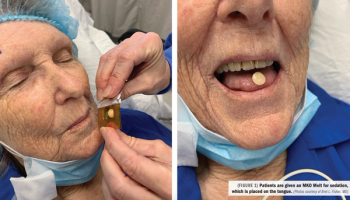
Are we ophthalmologists 'easy marks' for drug reps?
Do you know how sometimes people or groups assert something to be true, but it just doesn't seem to make sense? For me, this was always true with discussions about "direct-to-physician" (DTP) marketing activities by pharmaceutical companies.
According to some consumer advocacy groups, hospital formulary committees, managed care organizations, medical ethicists, and public policy organizations, DTP efforts induce physicians to prescribe more expensive branded drugs needlessly, even when generic medications are available. According to this argument, drug costs spiral out of control because we doctors are so easily swayed by "drug reps."
The solution that many hospitals and health maintenance organizations propose is to limit the ability of reps to meet with doctors, to empower hospital or practice group committees to decide what drugs go on the formulary, and to prevent doctors from prescribing the expensive drugs that the reps tell them to. In other words, as much as possible the selection of drugs to be prescribed should be taken out of the hands of the physicians, who are too easily swayed by DTP marketing.
Well, according to Natalie Mizik, PhD, assistant professor at Columbia University's Business School, I was right to be skeptical. Under condition of anonymity, she obtained the data from a large U.S. drug manufacturer related to DTP marketing efforts and new prescriptions for three drugs. Her data show that visiting with physicians and providing free samples had "only a modest influence on prescribing decisions," and that any effect rapidly dissipated over time.
Dr. Mizik's study shows that physicians are "tough sells," and not the "easy marks" that non-physicians have alleged.
Why don't physicians respond to DTP efforts as many claimed they did? According to Dr. Mizik, "scientific papers, advice from colleagues, and physician's own training and experience also affect prescribing decisions," and "most physicians regard these influences as far more important." Well-duh!
In my opinion, many widely held beliefs have never been scientifically examined, and many are wrong. That physicians are pretty much "dupes" who are guided by DTP marketing efforts is, I have long suspected and now am pleased to read, one of those often-stated and wrong beliefs.
Apparently, Dr. Mizik's study is the first to address this issue objectively and scientifically. According to her data, and contrary to the biases, assumptions, or even explicit assertions of many, we physicians are not bereft of integrity, nor are we mindless tools of pharmaceutical representatives.
In fact, it seems we are putting our medical school and post-graduate educations to good use when deciding what to prescribe. Maybe all those years in school and hours in continuing medical education courses (not to mention the valuable time you spend reading Ophthalmology Times) are important after all.
Peter J. McDonnell, MD is director of The Wilmer Eye Institute, The Johns Hopkins University School of Medicine, Baltimore, and chief medical editor of Ophthalmology Times. He can be reached at 727 Maumenee Building, 600 North Wolfe St., Baltimore, MD 21287-9278 Phone: 443/287-1511 Fax: 443/287-1514 E-mail:
Reference
Newsletter
Don’t miss out—get Ophthalmology Times updates on the latest clinical advancements and expert interviews, straight to your inbox.





























